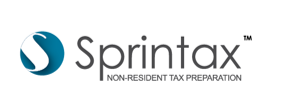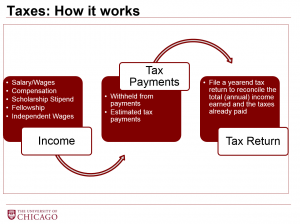Sprintax Nonresident Tax Webinars
-
Wednesday, April 3, 2024 @ 1pm CST – Register here
-
Thursday, April 11, 2024 @ 12pm CST – Register here
-
Monday, April 15, 2024 @ 10am CST – Register here
Tax Information Videos for UChicago graduate students and postdocs available here!
Sprintax codes will be sent by OIA in early-March to all international students to ensure students receive all relevant tax forms. Filing a return without the necessary forms can prompt an incorrect submission, which is why Sprintax codes are sent in early-March. Keep in mind the code you received last year was specific to last year and you will need the updated code to receive a free federal filing using Sprintax. Any required state tax returns will be processed by Sprintax for a fee.
About Taxes in the U.S.
Tax Requirement and Tax Residency Status
F-1 and J-1 international students and scholars who were present in the U.S. during any portion of the past calendar year may be required to file certain tax forms with the U.S. federal government. This is true whether or not you worked in the U.S., gained income in the U.S., or received a scholarship during the past calendar year.
The staff at OIA are not trained in taxation, and therefore cannot answer specific tax questions or help you prepare your tax forms. Ultimately, it is your responsibility to meet your tax obligations and do so accurately.
The University will hold webinars regarding the tax filing process each year beginning in February. Information on dates/times will be shared by OIA, UChicagoGRAD, Office of the Bursar, and likely via several other channels. Please keep an eye out for these. Recordings will be made available after.
What is a Tax Return or Tax Filing? Why Do I Need to File?
Any of your earnings in the U.S. are subject to applicable federal, state, and local taxes. Filing tax paperwork, such as a tax return, is a reconciliation that compares what you paid in taxes throughout the year to what you should have paid in taxes.
When you start a new job or receive taxable money, you typically will complete Tax Withholding paperwork, which dictates how much tax should be withheld from your payment. Employers and schools then withhold taxes from your paychecks or other taxable income (such as stipend payments). If the taxes that were withheld from your payment are higher than what you should have paid, you will get a refund after filing your tax return ("tax refund"). If taxes were not withheld, or insufficient tax was withheld, then you will owe money by the filing deadline (typically April 15 of each year). You declare your income and account for the taxes owed on a form or set of forms called a “tax return.”
Even if you didn't receive any taxable income, you may be required to file some forms with the IRS.
What Forms Do I Need to Complete?
Tax forms may vary depending on your individual residency status for tax purposes and employment status. The Internal Revenue Service (IRS), an agency of the U.S. government, determines tax residency based on the two classifications outlined below. Before you file your taxes, you must determine your tax residency status, which may be different from your immigration status.
- Residents for tax purposes (also called 'resident alien'): All U.S. citizens, legal permanent residents, and nonresident aliens for immigration purposes who have met the Substantial Presence Test.
- Non-residents for tax purposes (also called 'nonresident aliens'): all others, regardless of immigration status.
- How to determine your tax residency status.
When do I Need to File With The IRS?
When do I prepare my tax forms?
Most of our international population will file their tax paperwork between late-February and early April.
If you received taxable income last year, you will need to receive relevant payment documents from your employer or school before you can complete your tax return. Usually, schools and employers provide these tax documents between January and March. They are typically provided by mail, so it is important to keep your address updated with current and former employers.
What is the deadline for filing taxes with the IRS?
The deadline for filing your tax paperwork with the IRS depends on whether or not you received any taxable income in the previous calendar year. You must file your taxes before the tax deadlines listed below:
- If you received taxable income in 2023: April 15, 2024
- If you did not receive taxable income in 2023: June 15, 2024 (filing form 8843 only)
If you received any reportable money/income in the previous year (e.g. income, salary, taxable scholarships, grants, or awards), you will need to have any/all relevant tax forms before you can file your tax paperwork. These tax forms come from U.S. employers, stipend/scholarship providers, or schools. The forms, (e.g. W-2, 1042-S, etc) provide information about the amount of money you were paid and what amount was withheld from your payment for tax purposes.
What Happens if I Don't File Tax Documents with the IRS?
Filing tax documents each year is an important part of maintaining your immigration status and is a federal requirement for international visitors and their dependents. Not filing your required taxes could lead to penalties, such as fines, or even negatively impact your immigration status.
If you apply for future immigration benefits, such as H-1B, Permanent Residency, or other statuses, you will likely be asked to provide copies of tax filings for all previous years you were in the U.S. If you forgot or didn't file in previous years when you should have, the IRS recommends that you file now for previous years. You can find the relevant forms from past years on the IRS website.
The IRS expects you to file your taxes each year. Penalties for late filing may include fines, interest on taxes owed, or other consequences. Visit the IRS website for information on Filing Past Due Tax Returns. You can follow up with the IRS or a foreign tax expert if you have questions.
Steps to Fulfilling Tax Requirements
The steps below provide the basic instructions for meeting your tax obligations. Click on the links throughout the steps for more information and detail:
STEP 1: Determine Tax Residency Status
Before beginning the process of filing a tax return you must first determine whether you are a 'non-resident alien' or a 'resident alien' for tax purposes:
STEP 2: Determine If You Received Taxable Income
You will need to know whether or not you received taxable income before filing your tax paperwork. The most common types of taxable income for our international population include wages or payment received from a job or taxable stipends and awards from the university. Generally speaking tuition waivers for degree seeking students are not reportable.
OIA cannot help you determine if you've received taxable income or not.
Please review taxes.uchicago.edu to help determine what income is reportable/taxable, and if you should receive a subsequent document.
STEP 3: Collect Relevant Tax Documents
Before you complete your tax paperwork, you will need the following documents:
- Valid Passport
- Most recent immigration status documents (e.g. I-20 or DS-2019)
-
All relevant tax documentation from employers, stipend providers, or other relevant entities who distributed taxable money (e.g. W-2, 1042-S and/or 1099).
- If you received reportable income, you must wait to receive all relevant documents before completing your tax return. You will not able to alter or edit your tax documents after you submit them to the IRS.
- If you received money from the University of Chicago, you can check taxes.uchicago.edu for information regarding university issued tax documents.
-
All US entry and exit dates
- You can look up your travel history on the I-94 website for reference.
**If you received any reportable money in the previous year (e.g. income, salary, taxable scholarships, grants, or awards), you will need to have any/all relevant tax forms before you can file your tax paperwork. These tax forms might come from U.S. employers, stipend/scholarship providers, or schools. The forms, (e.g. W-2, 1042-S, etc) provide information about the amount of money you were paid and what amount was withheld from your payment for tax purposes.
How do I get the necessary forms?
If you received payment from the University of Chicago, visit: https://bursar.uchicago.edu/tax-information-for-uchicago-students-2/ for information about various tax forms. Otherwise, check with your employer or the organization that provided the scholarship for information about when and how you will receive relevant tax forms. Your employer/award granter might mail you paper copies of these forms, so it is important to keep former employers aware of any addresses changes. NOTE: OIA does not have access to or copies of or access to your tax forms.
STEP 4: Complete and Send Tax Paperwork to the IRS
Once you've determined your tax residency status and have any/all relevant forms, you can start filing your tax paperwork. The specific tax forms you must file depend on your tax residency status and whether or not you received any taxable money. Review the relevant tax residency section below for more information on filing and submitting your tax documents:
Residents for Tax Purposes: Filing Instructions
If you are a 'resident for tax purposes', see: Tax Filing: Residents for Tax Purposes
Non- Residents for Tax Purposes: Filing Instructions
If you are a 'non-resident for tax purposes', review the filing information on the link below:
-
NEXT STEP: Tax Filing: Non-Residents for Tax Purposes
- No income? Learn how to file an 8843
- If you received income in the previous year, you can use Sprintax Tax Filing Software for Non-Residents. To support our international population, OIA pays for software licenses that allow most UChicago non-residents in F-1 and J-1 status to file federal taxes through third-party vendor (Sprintax) for free or a reduced cost.
- Sprintax will become available in late-February/early-March for students and scholars.
- Keep in mind that each year a new Sprintax code will be made available by OIA. The code you used one year will not be the same code you use the next year.
-


